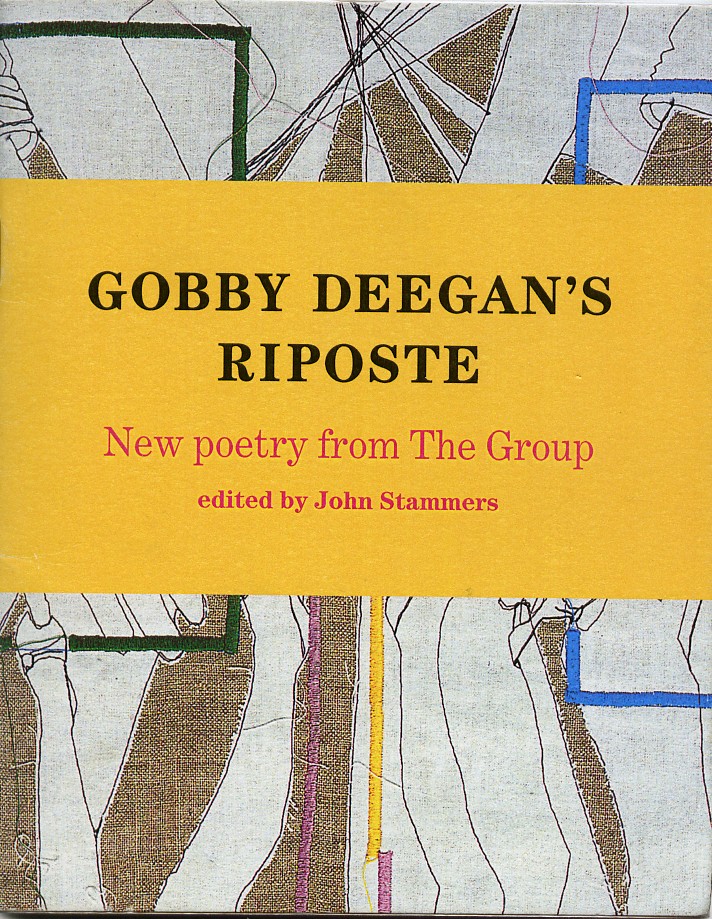***This is a brand new London, England-based Book and Music
Review section.***
For more info
A review of Gobby Deegan's Riposte
(New Poetry from The Group, LONDON, U.K., 2004)
Edited by John Stammers
"Tight little book bristling with talent."
 Good
chapbooks of quality writing exist in Toronto: Junction Books
has published some fine poets in Adrienne Weiss, Paul Vermeersch,
Adam Getty, Ray Hsu over the past couple of years. In Gobby
Deegan`s Riposte London poet (and 2001 Forward/Waterstones
Prize winner) John Stammers has selected some fine writers from
a writing class and produced a short, compelling and imaginative
little book. The mot du jour of the poetry community is
'Chapbook' spat out in some circles as 'Crapbook' but that is
not the case here.
Good
chapbooks of quality writing exist in Toronto: Junction Books
has published some fine poets in Adrienne Weiss, Paul Vermeersch,
Adam Getty, Ray Hsu over the past couple of years. In Gobby
Deegan`s Riposte London poet (and 2001 Forward/Waterstones
Prize winner) John Stammers has selected some fine writers from
a writing class and produced a short, compelling and imaginative
little book. The mot du jour of the poetry community is
'Chapbook' spat out in some circles as 'Crapbook' but that is
not the case here.
What is nice about the writing is the understated tone of the
work. These are not the words of the lively young turks of the
open mics, rather the musings of pensive and articulate souls.
Take the paper hat, paper hat and undertow? of Susan
Grindley`s Discovery. Are the words, simply notes-to-self
scratched into the margins of a newspaper, missing words from
a crossword puzzle? Or a code to a secret bank account in Paris?
Like a thriller writer, Grindley creates intrigue from the mundane.
In Grindley`s The Doyenne, the narrator hopes, perhaps
resolutely, that 'young men will fight at my signings to hand
me a pen but that (she) won`t have to listen to them.' Cleverer
and more imaginative perhaps, is the title poem Gabby Deegan`s
Riposte:
'All them bad things you says I is, you is all them things
also.
Them bad things you says I is, you is also all them things.
Bad things, all them things...'
(and so on)
Repeated in different combinations and to different effect
fourteen (14) times.
Annie Freud`s The Study of Disease is painterlike and
contains all the usual themes of good poetry: sex, death, disease,
nastiness, affairs of the heart, femininty, eggs, ovulation. The
narrator sets the tone with a 'heart which thumped like a boot
against her ribs.' In The Symbolic Meaning of Things and Reasons
for not Dying:
'I stood at the Centre Point, soaked to the skin,
fighting the habits of my filthy mood...
...a libidinous negligee ripped to shreds...'
Rosin Tierney`s Lucid Interval has some of the earnestness
of almost good writing, a little dud in the 'as water reflected
light and not the inner workings of your soul.' Anna a
better poem sparkles with promise:
'Wild-out she was, running through Brixton...'
Other fine poems such as Valerie Joseph's Green Minx and
Sinead Wilson`s Victorian Lovemaking round out the collection
from the ladies.
Though a little light on the male offerings - there are three
male poets of ten - all three of the men, Graham Mummery, Edward
Barker and John Stammers write of being outside. Not outsiders,
but battling, or noticing, the elements. Whereas there is a tinge
of eroticism in a little of the womens work, the men are more
stoic or else their poetry presents them as such. Mummery`s Winter
Task is an open meditation about writing a poem about
the the menial tasks of life outside the flat with Mozart's music
offering a temporary reprieve - even if, as Mummmery states -
later, you throw the poem away. In Laden, Edward Barker,
sees the tree fall 'become a wish.' For what resolution? Inspiration?
We are left with a feeling of a mind in suspense. With In the
Marshes, John Stammers, the most well-known and celebrated
of the poets observes the sky, a bird:
'...the skylark engraves the sky
with the Spirograph of its release:
uuuuuuuuuuuuuuuuuuuuuuuuuuuu...The
hours
absorb the men, they tramp beneath the cry
of the birds...'
This is a tight little collection bristlings with some lurking
but understated talent.
PREVIOUS REVIEW
REMEMBER READERS?
NEXT REVIEW
 Good
chapbooks of quality writing exist in Toronto: Junction Books
has published some fine poets in Adrienne Weiss, Paul Vermeersch,
Adam Getty, Ray Hsu over the past couple of years. In Gobby
Deegan`s Riposte London poet (and 2001 Forward/Waterstones
Prize winner) John Stammers has selected some fine writers from
a writing class and produced a short, compelling and imaginative
little book. The mot du jour of the poetry community is
'Chapbook' spat out in some circles as 'Crapbook' but that is
not the case here.
Good
chapbooks of quality writing exist in Toronto: Junction Books
has published some fine poets in Adrienne Weiss, Paul Vermeersch,
Adam Getty, Ray Hsu over the past couple of years. In Gobby
Deegan`s Riposte London poet (and 2001 Forward/Waterstones
Prize winner) John Stammers has selected some fine writers from
a writing class and produced a short, compelling and imaginative
little book. The mot du jour of the poetry community is
'Chapbook' spat out in some circles as 'Crapbook' but that is
not the case here.